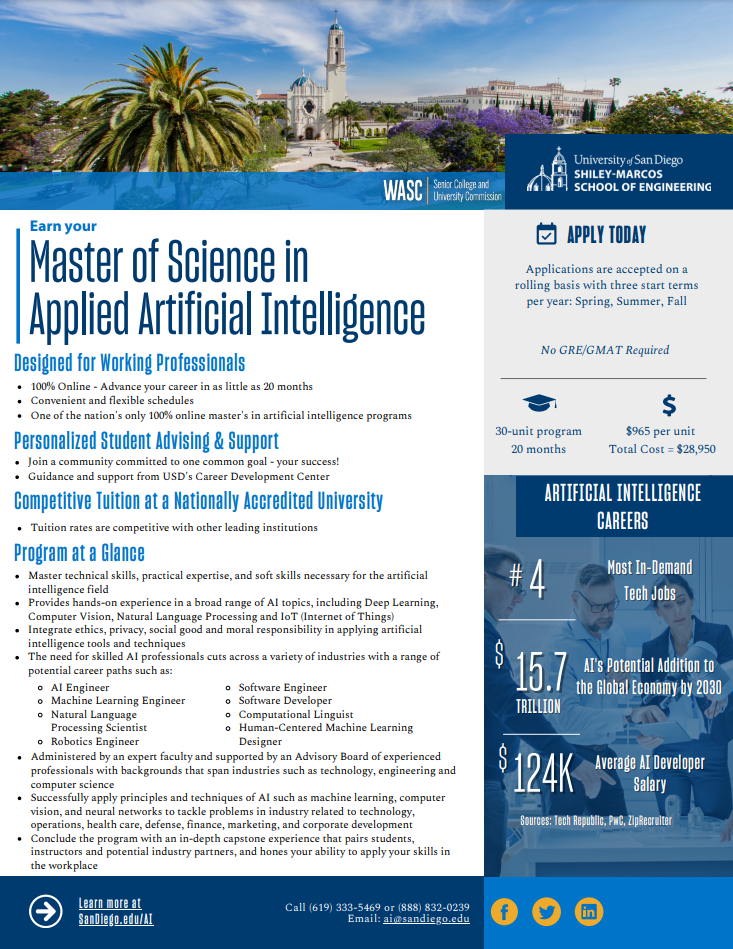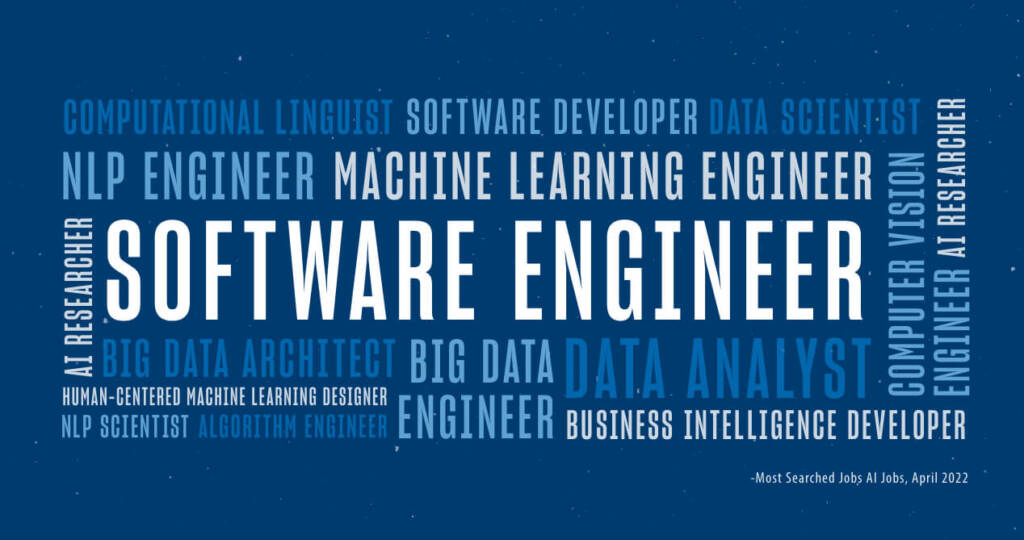What Is Artificial Intelligence?
Artificial intelligence is all around us, even in places you may not realize. From music preferences to home appliances and healthcare, the power of AI is far reaching. But first, let’s explore the basics of AI with this definition from Investopedia:
“AI refers to the simulation of human intelligence in machines that are programmed to think like humans and mimic their actions. The term may also be applied to any machine that exhibits traits associated with a human mind such as learning or problem-solving.”
Examples of artificial intelligence include:
- Smart assistants like Siri and Alexa
- Pandora and Netflix, which provide personalized song and entertainment recommendations
- Chatbots
- Robotic vacuum cleaners
- Self-driving vehicles
- Facial recognition software
Those are just a few of the many, many examples. Needless to say, artificial intelligence is everywhere, and the demand for AI — especially skilled, experienced AI professionals — is growing. Bernard Marr, a business and technology advisor to governments and companies, told Forbes that we now have access to more data than ever, which means AI has become smarter, faster, and more accurate.
“As a very simple example, think of Spotify recommendations,” he explained in the article. “The more music (or podcasts) you listen to via Spotify, the better able Spotify is to recommend other content that you might enjoy. Netflix and Amazon recommendations work on the same principle, of course.”
What Does an AI Professional Do?
Since artificial intelligence is an increasingly widespread and growing form of technology, professionals who specialize in AI are needed now more than ever. The good news is that the AI professional field is full of different career opportunities, which means you can take on different roles and responsibilities depending upon the position, your experience and your interests.
The need for skilled AI professionals spans nearly every industry, including:
- Financial services
- Healthcare
- Technology
- Media
- Marketing
- Government and military
- National security
- IoT-enabled systems
- Agriculture
- Gaming
- Retail
Professional AI Skills in Demand for 2025
If you’re looking to enter the professional world of AI, it’s important to make sure you have the right skills, which will set you apart from other candidates and help you land the perfect position. First, competencies with calculus and linear algebra are extremely important. Also, if you’re interested in AI, you should have some knowledge and experience in at least one of the following programming languages:
- Python
- C/C++
- MATLAB
According to ZipRecruiter, these are the top 5 skills required for AI jobs:
- Communication skills
- Knowledge and experience with Python specifically (in general, proficiency in programming language)
- Digital marketing goals and strategies
- Collaborating effectively with others
- Analytical skills
The Intellipaat blog also recommends these additional skills for AI professionals:
- Solid knowledge of applied mathematics and algorithms
- Problem-solving skills
- Industry knowledge
- Management and leadership skills
- Machine learning
7 Technical AI Skills in Demand for 2025
As the applications of artificial intelligence continue to expand across various industries, the demand for specific technical skills is rising. Staying current with these skills is crucial for anyone looking to succeed in this field. Here’s a look at the most in-demand technical AI skills and how you can acquire them through certifications and training programs:
- Machine Learning
Understanding algorithms, models and how to implement them using libraries like TensorFlow or PyTorch. - Deep Learning
Specializing in neural networks and their applications in natural language processing, image recognition and more. - Data Analysis and Visualization
Proficiency in tools like Tableau, Power BI and programming languages such as R and Python to interpret and present data. - Natural Language Processing (NLP)
Skills in working with text data to build applications like chatbots, sentiment analysis tools and more. - Robotics
Knowledge in designing, building and programming robots for various applications. - Computer Vision
Expertise in extracting information from images and video data using algorithms and models. - Cloud Computing
Experience with platforms like AWS, Google Cloud or Azure for deploying and scaling AI solutions.
To bolster these skills, consider obtaining AI certifications such as:
- IBM Applied AI Professional Certificate
Build job-ready AI skills, including generative AI and chatbots, in this ten-course, self-paced program with hands-on labs. Complete it in six months at four hours per week to earn a Professional Certificate and digital badge from IBM. - IBM AI Engineering Professional Certificate
Master machine learning and deep learning techniques in this six-course program. Complete it in two months at 10 hours per week to earn a Professional Certificate and digital badge from IBM. - Google Advanced Data Analytics Professional Certificate
Gain skills in statistical analysis, Python programming and machine learning. This seven-course program includes over 200 hours of instruction, completed in six months at 10 hours per week. Graduates receive a Professional Certificate from Google and access to career resources and job opportunities with over 150 U.S. employers.
How to Start a Career in Artificial Intelligence
Starting a career in AI requires a combination of education, practical experience and strategic job searching. If you aren’t already in the industry, the first step is to conduct research. This includes talking to current AI professionals and researching reputable colleges and programs.
According to Springboard, hiring managers will probably require at least a bachelor’s degree in math and basic computer technology, but in many cases, a bachelor’s degree will only qualify you for entry-level positions. Undergraduate degrees in computer science or engineering are good starting points.
Dan Ayoub, general manager for mixed reality education at Microsoft, explained in a Best Colleges article that “curiosity, confidence, and perseverance” will benefit students looking to break into an emerging field like AI. He noted that familiarity with data science, machine learning and Java are good places to begin, with specialized training offered through degree programs. There are many new undergraduate and graduate programs designed to prepare students specifically for AI careers.
For those looking to set themselves apart, a master’s degree in artificial intelligence can provide firsthand experience and knowledge from industry experts. Those interested in pursuing a master’s in AI should have a strong foundation in math, computer science and data analytics.
Learn More: 8 Essential Questions to Ask Before Choosing an AI Master’s Program
Once you have the necessary educational background, gaining hands-on experience is crucial. Entry-level roles within AI can provide a solid foundation for various career paths in the field. Here are some examples of entry-level artificial intelligence jobs:
- AI Internships
An AI intern assists in developing and training machine learning models, analyzing data, and supporting various AI research and development projects. Many companies offer internships for current college students and recent graduates to gain hands-on experience. - Junior Data Analyst
This role involves analyzing datasets to uncover patterns and insights. - Machine Learning Intern
This position focuses on assisting in building and training machine learning models. - Research Assistant
The responsibilities of this role include supporting AI research projects at universities or tech companies. - AI Support Specialist
This artificial intelligence job involves helping users troubleshoot AI applications.
To find entry-level roles like these, consider the following strategies:
- Expand your professional network by attending AI conferences and meetups and joining online communities.
- Explore job portals by regularly checking AI-specific job boards such as AI Jobs, LinkedIn and Indeed.
- Browse the career sections on websites of companies known for their AI work.
- Join professional AI and data science associations to access job postings and networking opportunities
14 Career Paths in Artificial Intelligence
From developing algorithms to analyzing large datasets, AI professionals can choose from various roles that align with their skills and interests. Here are some additional AI career paths to consider:
| Career Path | Description | Median Annual Salary |
| Big Data Analyst | Find meaningful patterns in data by looking at the past to help make predictions about the future. | $123,210 |
| User Experience (UX) Designer/Developer | Work with products to help customers understand their function and can use them easily. Understand how people use equipment and how computer scientists can apply that understanding to produce more advanced software. | $82,364 |
| Natural Language Processing Engineer | Explore the connection between human language and computational systems; this includes working on projects like chatbots and virtual assistants. | $119,000 |
| Researcher | Work with computer science and AI research Discover ways to advance AI technology | $82,165 |
| Research Scientist | Expert in applied math, machine learning, deep learning, and computational stats. Expected to have an advanced degree in computer science or an advanced degree in a related field supported by experience. | $150,000 |
| Software Engineer | Develop programs in which AI tools function. The role may also be referred to as a Programmer or Artificial Intelligence Developer. | $94,912 |
| AI Engineer | Build AI models from scratch and help product managers and stakeholders understand results. | $204,000 |
| Data Mining and Analysis | Finding anomalies, patterns, etc. within large data sets to predict outcomes. | $137,000 |
| Machine Learning Engineer | Using data to design, build and manage ML software applications. | $157,969 |
| Data Scientist | Collect, analyze and interpret data sets. | $163,000 |
| Business Intelligence (BI) Developer | Analyze complex data sets to identify business and market trends | $99,780 |
| Big Data Engineer/Architect | Develop systems that allow businesses to communicate and collect data | $205,000 |
| Robotics Engineer | Design, build and test robots or robotic systems. | $64,728 |
| Computer Vision Engineer | Develop and work on projects and systems involving visual data. | $127,000 |
| Data Engineer | Design and maintain data pipelines and ensure data is accessible for analysis. | $109,675 |
| AI Ethicist | Ensures the ethical implications of AI technologies are considered in their development and deployment. | $137,000 |
| Algorithm Developer | Specializes in creating algorithms for various AI applications. | $158,499 |
| UX Developer | Focuses on creating user-friendly AI interfaces and experiences. | $120,000 |
Artificial Intelligence Job Outlook
The job outlook for AI professionals is extremely promising, with ZipRecruiter predicting the industry to “grow explosively as it becomes capable of accomplishing more tasks.”
In an article on Built In, Satya Mallick, founder of Big Vision LLC/Interim CEO, OpenCV.org, likened AI to “a rocket ship that is taking off.” He also explained that even entry-level jobs can pay extremely well. “The reason is a huge demand for AI talent and not enough people with the right expertise,” he explained.
The U.S. Bureau of Labor Statistics expects employment of computer and information technology occupations to grow 26% from 2023 to 2033.
Companies Currently Hiring AI Positions
A recent search for artificial intelligence job openings on LinkedIn revealed thousands and thousands of results at a wide variety of companies. Here is a sample of some of the positions we found. (You can see similar LinkedIn search results here.)
- Samsung Electronics America — Machine Learning Serving Engineer – VD
- Pfizer — Director, Data Science and AI
- Starbucks — Decision Scientist Sr – Workforce Management
- Roku — Senior Manager, Data Science
- Yahoo — Research Scientist
- Thermo Fisher Scientific — Engineer III, Artificial Intelligence
- United States Postal Service — Artificial Intelligence Architect
- CVS Health — Conversational AI Principal Architect
As you can see from the list above, there are many different types of positions within artificial intelligence. Some of the most common AI-related job titles, courtesy of Glassdoor, include:
- Software engineer
- Data scientist
- Software development engineer
- Research scientist
In general, tech companies (both software and hardware) dominate the list of companies that are hiring AI professionals. But a quick search on any reputable job listing site will give you a list of positions that span a variety of industries. Here is a sample of some of the top companies that are hiring for these types of AI roles:
- NVIDIA
- Deloitte
- Amazon
- Accenture
- H&R Block
- IBM
- PwC
- Fidelity Investments
- PayPal
- Major League Baseball
- Harvard Business School
- IKEA
Artificial Intelligence Salaries
Salaries are dynamic, which means the numbers we’ve listed below will fluctuate due to inflation, trends, the job market, demand and other factors.
According to our degree page, the average salary for an artificial intelligence programmer ranges from $100,000 to $150,000. Salaries are significantly higher for AI engineers, averaging $171,715 with the top 25% earning above $200,000.
There are a range of averages, depending on the position and the responsibilities, but here are the most popular:
- According to Indeed, the salary for artificial intelligence careers ranges from approximately $124,427 for a full stack developer to $162,168 for a machine learning engineer.
- The average annual base pay for artificial intelligence salaries in the United States is $170,000, according to Glassdoor.
- According to Talent.com, the average artificial intelligence salary is $153,119 per year. Entry positions start at $115,000, and most experienced employees can make up to $204,000 per year.
Artificial Intelligence Career FAQs
Educational Preparation in Artificial Intelligence
Exciting, high-paying career opportunities in AI continue to expand across a variety of industries. The University of San Diego — a highly regarded industry thought leader and education provider — offers an innovative, online AI master’s degree program, the Master of Science in Applied Artificial Intelligence, which is designed to prepare graduates for success in this important fast-growing field. This program includes a significant emphasis on real-world applications, ethics, privacy, moral responsibility and social good in designing AI-enabled systems.




